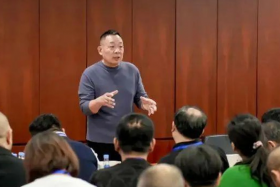Get culture fit or face failure
Being able to adapt to local cultures is key to success of companies that go abroad
The success of companies that venture abroad hinges on how they adapt to local cultures and address cultural differences.
Those that have a strong and distinct organisational culture have historically been more vulnerable to cultural conflicts in foreign countries.
In terms of "cultural fit", companies have to pay close attention to two specific aspects, research from Nanyang Business School's Centre for Business of Culture found.
First, companies in a foreign host country need to adapt to the habits and cultural expectations of local consumers. Consider the experiences of American retail giant Walmart in Germany and Japan.
In Germany, local customers viewed the friendly approach of Walmart's American staff as flirting. This failure to adapt to German culture contributed to the demise of Walmart's operations in the country in 2006.
In Japan, Walmart acquired a stake in the supermarket operator Seiyu and tried to woo customers with its "Every Day Low Price" marketing campaign that was highly successful in the United States. But Walmart failed to attract shoppers because the Japanese regarded lower-priced products as being inferior in quality.
Home Depot, a US hardware retailer, was unsuccessful in selling its "do-it-yourself" products in China because consumers expected fully finished goods, given the relatively low costs of Chinese labour.
This underscores the importance of adapting to the needs and culture of the host country - a key research focus of the Institute on Asian Consumer Insight at Nanyang Technological University.
CULTURAL DIFFERENCES
The second aspect of "cultural fit" for companies is about managing the cultural differences between their host country and their home country in areas such as regulatory affairs, business practices, employees' behaviour and stakeholders' expectations.
Take the case of LG Display, a South Korean LCD panel maker, in Poland.
Soon after it started production in the city of Wroclaw in 2007, many Polish workers resigned and productivity declined as they were dissatisfied with the Korean work culture.
The Polish workers were upset by their Korean managers' seeming disregard of their time away from work.
The managers invited local workers to take part in team-building exercises on weekends, which the Poles regarded as an unwelcome intrusion into their time with their family.
Unlike the Polish, who believe that decisions should be made based on rules regardless of the people involved, the Koreanapproach to decision-making was flexible, depending on the context and people involved.
The Koreans also extended their flexibility to tasks and projects, sometimes working on several tasks simultaneously.
The Polish workers also differed with their managers on performance evaluation. While the Poles wanted to be appraised for individual work, the Koreans sought to assess the workers as teams, in keeping with the Korean culture of prizing the group above the individual.
BRIDGING THE DIVIDE
LG Display did make efforts to bridge the cultural differences, and make its company culture more international.
It introduced training programmes and sports activities, and invested time, energy and resources in making its factory in Wroclaw a "joyful company". LG Display built gymnasiums and green walkways and installed table tennis tables to promote bilateral interactions.
It also organised Polish-Korean football competitions and other recreational activities during work hours.
These efforts, however, hurt the company's profit margins.
All this shows that companies face operational challenges if they do not adapt their organisational culture to the social and business cultures of the countries in which they operate.
Companies should therefore adopt an organisational culture that is universal in outlook and practice. That would help better engage their foreign workers and boost productivity, increasing returns on investment.
Indeed, addressing the issue of "cultural fit" is important to companies not only for their organisational performance but also for meeting the demands of foreign consumers.
Professor K. Ravi Kumar is the Shaw Chair Professor and Associate Provost (Special Projects) at Nanyang Technological University. Dr Divya Bhutiani is a post-doctoral research fellow at Nanyang Business School's Centre for Business of Culture. This article appeared in The Business Times on Nov 3.
Get The New Paper on your phone with the free TNP app. Download from the Apple App Store or Google Play Store now


